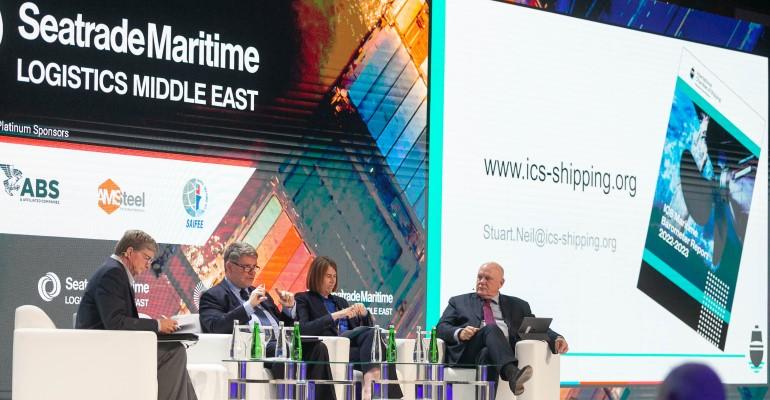At Seatrade Maritime Logistics Middle East, part of the UAE Maritime Week, Stuart Neil, Director of Strategy & Communications, International Chamber of Shipping (ICS) unveiled the results of a survey of 132 C-suite executives representing its membership from around the world.
Neil announced the publication of the 27-page ICS Maritime Barometer Report 2022-2023 during the keynote panel discussion on the topic of maritime’s responsibilities on the road to COP28.
“I'm pleased to say that the key takeaway from the report is that industry feels very, very confident about delivering on change,” said Neil.
“The report talks about the approach to zero carbon technologies, fuels understand how a to unlock that transition. When it comes to the question of which fuels ships we'll be using in the future, as we look at our zero-emissions futures, there's a wide range of views in terms of the fuel types, and when we're likely to see these fuels in our industry,” said Neil.
Risk appraisal
While concerns over political instability were already on the rise in a smaller 2021 version of the survey, respondents were now much more concerned and were trending towards becoming more concerned, according to the report.
The war in Ukraine, rising energy and food prices, tensions in the South China Sea and instability in South Asia were all noted as factors affecting the heightened feeling of risk, due their potential direct impacts on ships and shipping, and indirect impacts on demand.
Respondents also saw an increasing possibility of unilateral or regional regulation bringing increased financial risk and administrative burden to the industry. The concerns are likely driven by the progress of regulations in the EU, even though the bloc has said its regulation will include a mechanism to align with any future IMO greenhouse gas reduction regulation.
The report said that regional regulation “may even necessitate vessel redeployment if compliance cannot be demonstrated in a particular jurisdiction – a view reflected in the growing percentage of respondents expressing lower levels of confidence in coping with multiple regulatory frameworks.”
Cyber attacks remained a prominent concern within the report, one expected to remain as the industry increasingly adopts digital tools.
Environmental progress
Industry opinions on the various potential future fuels for the maritime industry evolved in the latest edition, the report showed, despite a clear overarching worry about how GHG reduction regulation will affect operations.
Stranded assets, lack of regulatory clarity, and the impact of carbon pricing were all among concerns raised by respondents, as well as pressures from reputation managements and investor requirements related to decarbonisation.
“More generally, the availability of competent and high calibre crew is a growing issue for ship operators, especially with an expanding global fleet operating in a more fractured geopolitical landscape,” said the report.
The ICS Maritime Barometer Report can be downloaded from the ICS website.
Copyright © 2024. All rights reserved. Seatrade, a trading name of Informa Markets (UK) Limited.
Add Seatrade Maritime News to your Google News feed.  |


